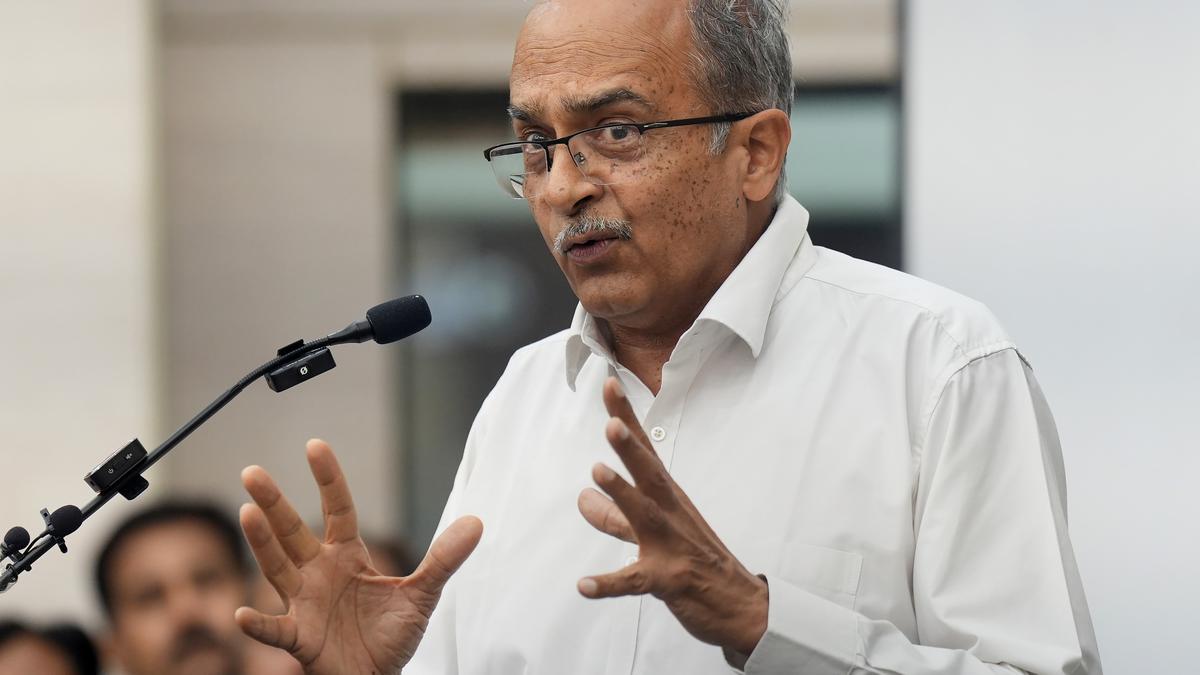
'One nation, one election' campaign aims to postpone elections in five States: Prashant Bhushan
The Hindu
BJP is fearing defeat in upcoming Assembly polls in five States. So, they are going to postpone the polls till the general election in 2024 in the name of ONOE. And, President Rule will be imposed in the States, he claimed.
Renowned Supreme Court lawyer and activist Prashant Bhushan alleged that the Central government has been campaigning for the “One nation, one election” (ONOE) only to postpone upcoming Assembly elections in five States.
The Assembly polls in Madhya Pradesh, Rajasthan, Chhattisgarh, Telangana and Mizoram are due later this year.
"ONOE cannot be implemented in a Parliamentary democracy like India because in our system a government can fall in midterm when it loses majority and a fresh government forms," Mr. Bhushan told reporters in Bhubaneswar on Sunday.
However, if the ‘one nation, one election’ will be implemented, in such a situation, Presidential rule will be imposed, which is against democracy, he claimed.
Also read | ‘One nation, one election’: Terms of 10 State Assemblies to end before or around 2024 Lok Sabha elections
"That means we are switching from democratic system to a presidential rule system. So it will be a total violation of parliamentary democracy. In my view, the government clearly knew about this and they also know that several amendments in the Constitution are required to switch to the Presidential rule system", Mr. Bhushan said.
He said the present government does not have the majority in Rajya Sabha. The government knew about all these facts. Still, they floated the balloon (one nation, one election) with only one objective to postpone the State elections in Madhya Pradesh, Rajasthan, Chhattisgarh, Telangana and Mizoram, which are due later this year.

“Writing, in general, is a very solitary process,” says Yauvanika Chopra, Associate Director at The New India Foundation (NIF), which, earlier this year, announced the 12th edition of its NIF Book Fellowships for research and scholarship about Indian history after Independence. While authors, in general, are built for it, it can still get very lonely, says Chopra, pointing out that the fellowship’s community support is as valuable as the monetary benefits it offers. “There is a solid community of NIF fellows, trustees, language experts, jury members, all of whom are incredibly competent,” she says. “They really help make authors feel supported from manuscript to publication, so you never feel like you’re struggling through isolation.”

Several principals of government and private schools in Delhi on Tuesday said the Directorate of Education (DoE) circular from a day earlier, directing schools to conduct classes in ‘hybrid’ mode, had caused confusion regarding day-to-day operations as they did not know how many students would return to school from Wednesday and how would teachers instruct in two modes — online and in person — at once. The DoE circular on Monday had also stated that the option to “exercise online mode of education, wherever available, shall vest with the students and their guardians”. Several schoolteachers also expressed confusion regarding the DoE order. A government schoolteacher said he was unsure of how to cope with the resumption of physical classes, given that the order directing government offices to ensure that 50% of the employees work from home is still in place. On Monday, the Commission for Air Quality Management in the National Capital Region and Adjoining Areas (CAQM) had, on the orders of the Supreme Court, directed schools in Delhi-NCR to shift classes to the hybrid mode, following which the DoE had issued the circular. The court had urged the Centre’s pollution watchdog to consider restarting physical classes due to many students missing out on the mid-day meals and lacking the necessary means to attend classes online. The CAQM had, on November 20, asked schools in Delhi-NCR to shift to the online mode of teaching.









